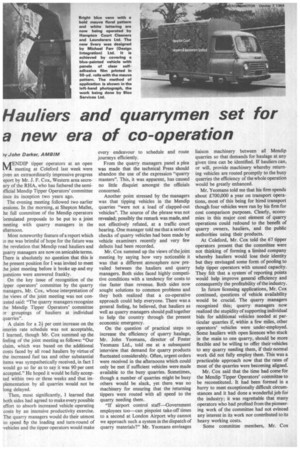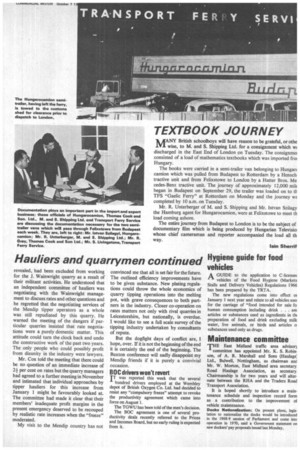Hauliers and quarrymen set for a new era of co-operation
Page 24

Page 25

If you've noticed an error in this article please click here to report it so we can fix it.
ly John Darker, AMB1M MENDIP tipper operators at an open meeting at Coleford last week were ;iven an extraordinarily impressive progress eport by Mr. J. F. Cox, Western area secreary of the RHA, who has fathered the semi)fficial Mendip Tipper Operators' committee ;ince its inception two years ago.
The evening meeting followed two earlier ;essions. In the morning, at Shepton Mallet, he full committee of the Mendip operators 'ormulated proposals to be put to a joint meeting with quarry managers in the afternoon.
Most noteworthy feature of a report which to me was brimful of hope for the future was the revelation that Mendip road hauliers and parry managers are now on amicable terms. rhere is absolutely no question that this is the present position for I was invited to meet the joint meeting before it broke up and my iuestions were answered frankly.
On the key issue of recognition of the ipper operators' committee by the quarry managers, Mr. Cox, whose interpretation of the views of the joint meeting was not contested said: "The quarry managers recognize the Mendip Tipper Operators' committee ar groupings of hauliers at individual quarries".
A claim for a 21 per cent increase on the interim rate schedule was not acceptable, I learned, though Mr. Cox summed up the feeling of the joint meeting as follows: "Our claim, which was based on the additional costs faced by all road hauliers by virtue of the increased fuel tax and other substantial items was sympathetically received, in fact I would go so far as to say it was 90 per cent accepted." He hoped it would be fully accepted within two or three weeks and that implementation by all quarries would not be long delayed.
Then, most significantly, I learned that both sides had agreed to make every possible effort to absorb increased vehicle operating costs by an intensive productivity exercise. The quarry managers would do their utmost to speed dp the loading and turn-round of vehicles and the tipper operators would make every endeavour to schedule and route journeys efficiently.
From the quarry managers panel a plea was made that the technical Press should abandon the use of the expression "quarry masters". This, it was apparent, has caused no little disquiet amongst the officials concerned.
Another point stressed by the managers was that tipping vehicles in the Mendip quarries "were not a load of clapped-out vehicles". The source of the phrase was not revealed; possibly the remark was made, and not effectively refuted, at a traffic court hearing. One manager told me that a series of checks of quarry vehicles had been made by vehicle examiners recently and very few defects had been recorded.
Mr. Cox summed up the views of the joint meeting by saying how very noticeable it was that a different atmosphere now prevailed between the hauliers and quarry managers. Both sides faced highly competitive conditions with a tendency for costs to rise faster than revenue. Both sides now sought solutions to common problems and they both realized that a co-operative approach could help everyone. There was a general feeling, he believed, that hauliers as well as quarry managers should pull together to help the country through the present economic emergency.
On the question of practical steps to increase the efficiency of quarry haulage, Mr. John Yeomans, director of Foster Yeomans Ltd., told me at a subsequent interview that demand for quarry products fluctuated considerably. Often, urgent orders were received in the afternoons which could only be met if sufficient vehicles were made available to the busy quarries. Sometimes, though a number of quarries might be busy others would be slack, yet there was no machinery for ensuring that the returning tippers were routed with all speed to the quarry needing them.
"If airport control staff—Government employees too—can pinpoint take-off times to a second at London Airport why cannot we approach such a system in the dispatch of quarry materials?" Mr. Yeomans envisages liaison machinery between all Mendip quarries so that demands for haulage at any given time can be identified. If hauliers can, or will, provide machinery whereby returning vehicles are routed promptly to the busy quarries the efficiency of the whole operation would be greatly enhanced.
Mr. Yeomans told me that his firm spends about £700,000 a year on transport operations, most of this being for hired transport though four vehicles were run by his firm for cost comparison purposes. Clearly, economies in this major cost element of quarry operations could redound to the benefit of quarry owners, hauliers, and the public authorities using their products.
At Coleford, Mr. Cox told the 67 tipper operators present that the committee were not thinking of forming a limited company whereby hauliers would lose their identity but they envisaged some form of pooling to help tipper operators with unused capacity. They felt that a system of reporting points would help improve general efficiency and consequently the profitability of the industry.
In future licensing applications, Mr. Cox continued, questions of vehicle availability would be crucial. The quarry managers recognized this; quarry managers now realized the stupidity of supporting individual bids for additional vehicles needed at particular quarries if, within a few miles, other operators' vehicles were under-employed. Some hauliers with open licences who stuck in the main to one quarry, should be more flexible and be willing to offer their vehicles to any quarry needing them, if their normal work did not fully employ them. This was a practicable approach now that the rates of most of the quarries were becoming aligned.
Mr. Cox said that the time had come for the Mendip Tipper Operators' committee to be reconstituted. It had been formed in a hurry to meet exceptionally difficult circumstances and it had done a wonderful job for the industry; it was regrettable that many operators who had profited from the pioneering work of the committee had not evinced any interest in its work nor contributed to its heavy working costs.
Some committee members, Mr. Cox revealed, had been excluded from working for the J. Wainwright quarry as a result of their militant activities. He understood that an independent committee of hauliers was negotiating with the Wainwright management to discuss rates and other questions and he regretted that the negotiating services of the Mendip tipper operators as a whole was still repudiated by this quarry. He warned the meeting of the dangers if particular quarries insisted that rate negotiations were a purely domestic matter. This attitude could turn the clock back and undo the constructive work of the past two years. The only people who could possibly profit from disunity in the industry were lawyers.
Mr. Cox told the meeting that there could be no question of an immediate increase of 2+ per cent on rates but the quarry managers had agreed to a further meeting in November and intimated that individual approaches by tipper hauliers for this increase from January 1 might be favourably looked at. The committee had made it clear that their members' inadequate profit margins in the present emergency deserved to be recouped by realistic rate increases when the "freeze" moderated.
My visit to the Mendip country has not convinced me that all is set fair for the future. The outlined efficiency improvements have to be given substance. New plating regulations could throw the whole economics of quarry tipping operations into the melting pot, with grave consequences to both partners in the industry. Closer co-operation on rates matters not only with rival quarries in Leicestershire, but nationally, is overdue. I would like to see a full scale survey of the tipping industry undertaken by consultants of repute.
But the dogfight days of conflict are, I hope, over. If it is not the beginning of the end it is certainly the end of the beginning. The Buxton conference will sadly disappoint my Mendip friends if it is purely a convivial occasion.
BO C drivers won't revert IT was reported this week that the several
hundred drivers employed at the Wembley depot of British Oxygen Co. Ltd. had decided to resist any "compulsory freeze" attempt to revoke the productivity agreement which came into force on August 1.
The TGWU has been told of the men's decision.
The BOC agreement is one of several productivity deals recently referred to the Prices and Incomes Board, but no early ruling is expected from it.




















































































































